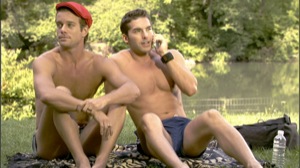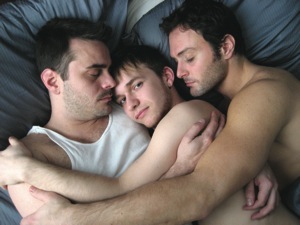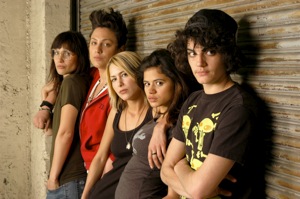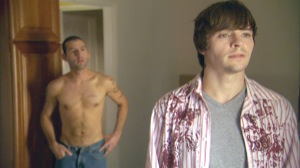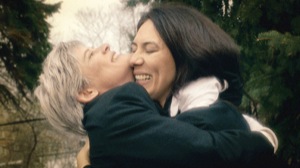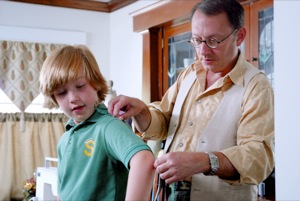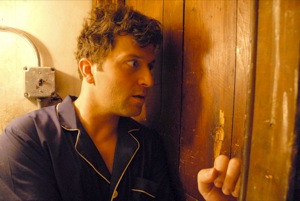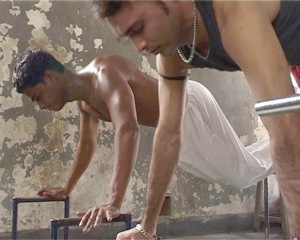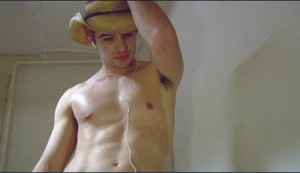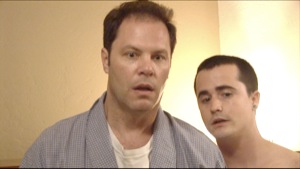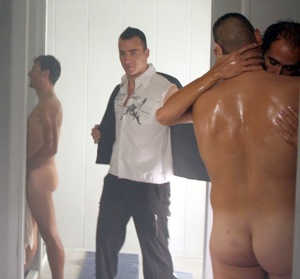-
- Author emerges as public face for the transgender community
- Lesbian priest wants license to minister in ND
- ACLU demands H&R Block allow civil union couples to file online
- Gay student’s slaying sparks outcry, demands for programs
- Social worker says he will oppose Sally Kern in fall elections
- Sex education skit raises concerns
- National News Briefs
- World News Briefs
feature
FilmOut San Diego ’08
Festival expands to celebrate 10 years
Published Thursday, 03-Apr-2008 in issue 1058
April 11-17 marks the 10th year FilmOut has treated local GLBT residents to a feast for the eyes. To mark the milestone, FilmOut is featuring 72 films in one week, longer than the typical four-day film festival.
The films span comedy (A Four Letter Word), drama (The Houseboy and Vivere), thriller (You Belong To Me and Finn’s Girl), science fiction (Socket) and horror (The Shadows and The Gay Bed & Breakfast of Terror) spread during theme nights, including International Night, Shorts Night and Camp/Thriller Night. And no FilmOut celebration would be complete without the popular boys and girls shorts.
The Gay & Lesbian Times talked with Michael McQuiggan, who, as programmer for FilmOut San Diego, sat through more than 600 hours of films this year to select those featured at the festival. McQuiggan wanted to feature more films during a longer period of time to celebrate the festival’s 10th anniversary.
“This is something that I’ve been wanting to do for the past few couple of years,” he said. “And this year I came on board saying, ‘Look this year’s the 10th anniversary – we can’t just do the same old four-day festival we’ve done for the last 10 years. We need to kick it up, and I think it’s a great year to kick off a week-long event.’”
McQuiggan said he received more submissions this year than in years past, and many were darker.
“ … A lot of the themes were kind of thriller-esque, film noir, kind of dark themes that are really controversial,” he said. “So a lot of these films are dark and have elements of thrillers.
“But, there are still the usual comedies and documentaries – for some reason this year there were just more of a darker side than in the past 10 years.”
The GLT also chatted with a number of the directors, whose creations are showcased at the festival this year. Here’s your one-stop guide to the best FilmOut has to offer.
Shadows and light
Sam Zalutsky’s thriller You Belong To Me is one of the films that has cast a shadow on lighter fare – and Zalutsky likes the diversity the festival’s darker films add to the lineup.
“It seems that with any kind of artistic social movement, the original effort was to portray, especially in gay films, our lives positively in the beginning to gain legitimacy and reflect positively back on our community,” he said. “I think now people are most interested in seeing a whole panoply of images about gay life. So we want to see the dark, scary thriller. I want to see a full range of gay characters and gay stories, and sometimes life is a romantic comedy, and sometimes life is a horror story – so why can’t we do all of those?”
In the suspenseful You Belong To Me, Jeffrey (Daniel Sauli) “coincidentally” moves into the same building as a former fling, – but Jeffrey is in for a surprise when he learns his apartment’s former tenant went mysteriously missing. He also learns his overly-friendly landlady Gladys (Patti D’Arbanville) is contending for his fling’s attention.
Rob Williams’ Back Soon focuses on a widower (Windham Beacham) who unexpectedly falls for another man (Matthew Montgomery), who is purchasing his home. The widower then begins seeing his dead wife’s ghost.
“The idea for Back Soon came out of my love of ghost stories and my frustration that there was never really a strong, gay ghost story,” Williams said. “It’s usually Kevin Costner’s wife dies and her spirit comes back in the body of a much younger, much hotter woman, and he falls in love with her.”
Another character who finds himself in an unusual predicament is Bill Matthews (Derek Long) in Socket.
When Matthews is struck by lighting, he meets others like him who have been electrocuted. When they connect for weekly meetings, their juices get going, so to speak.
Sean Abley, who wrote and directed the film, developed the unique premise during nearly a decade of work.
Abley, a horror and science-fiction aficionado who owns upwards of 1,000 sci-fi and horror DVDs, said there’s a growing market for gay films in these genres.
“We’re in a time where I think we’re past having to keep an eagle eye on whether or not the gay character lives or dies in a movie,” Abley said. “I think we are in a period now where its OK to have gay characters being the good guy and the bad guy, and the victim and the victor.”
Jaymes Thompson, who also wore two hats as writer/director on the set of The Gay Bed & Breakfast of Terror, sees the inclusion of a gay element as a “natural progression” in thriller and sci-fi films.
“You can say a lot of things in horror films that you can’t say in a lot of other films,” Thompson said. “For instance, in our film, we have a lot of different political messages, and we could never work those into a romantic comedy.”
The Gay Bed & Breakfast of Terror blends elements of camp and horror, and still make a political statement. In the film, an odd mother-daughter duo run a desert resort for gay and lesbian weekend revelers, who end up fighting for their lives.
Thompson said the key to making the film was balancing the camp and horror.
“It depends on where your sensibilities lie. As long as you don’t play it for laughs, so it’s too heavy-handed, because usually the humor develops and comes out of the situation. We tried to play it as serious as we could, and that’s hard to believe,” he said with a laugh.
Abley and Thompson both recruited actor Derek Long for their genre-bending films. For Long, acting in the back-to-back unconventional gay films was a nice change of pace.
“Audiences are ready to see something new,” Long said.
“In similarity, both films are looking at something very dark,” he said. “It’s just funny how they take different roads to get their message across.”
In Birthday Boy, another of the films in the genre featured at FilmOut, Martin (Steve Rowe) wants to have his cake and to eat it, too. He’s a married man who carries on with men and videotapes the encounters to playback while his wife is away.
When his daughter brings home her boyfriend (Derrol Murphy), Martin finds himself drawn to the young man – and the secrets he’s kept threaten to come out, putting each of the characters in danger.
“I’d hate my main character in real life,” said San Diego Birthday Boy director Dale Jeter. “I think he’s a terrible, selfish person, but those are the characters that are the most fun to watch. But I think he has the problem that a lot of people have, where he really doesn’t understand himself, and is a person that doesn’t really know what it will take to make him happy.”
Jeter, whose film was shot just around the corner from The Ken Cinema, where it will premiere during FilmOut, said he’s thrilled to have the film in the festival’s lineup.
“It’s incredibly important,” he said. “This is my first movie, so to have it shown anywhere is exciting.”
Moving out of the dark and into the light, James Vasquez, another San Diego native, will have his film Ready? Ok! be shown on closing night.
“It’s a pretty great honor,” Vasquez said of having his film screened in his hometown. “We got so much support from the San Diego gay and lesbian community and the community in general. So to get to world premiere at FilmOut, and have all of these people that worked on the movie get to celebrate that with us, it’s fantastic.”
Ready? Ok! revolves around a single parent (Carrie Preston) raising a son who prefers cheerleading over football. Rather than tell the story from the boy’s point-of-view, the movie is shown through the mother’s eyes.
“I consider it a love letter to parents of little gay kids,” Vasquez said. “The story really is centered around a little boy, but it is told from his mom’s perspective, and I think that’s an important story.”
Vasquez’s film is described as a “poignant comedy,” and he prides himself on being able to “create stories that you can take your mother to.”
Contrastly, Casper Andreas’ opening night film, A Four Letter Word, deals with monogamy versus promiscuous behavior and issues of equality, done with a sense of humor.
“The issue of the film is there are many different types of gay people and gay lifestyles, and ideas for what it means to be gay, and how you should behave as a gay man,” he said. “And I think that’s what we wanted to explore in the film. Definitely we deal with a bunch of gay issues, because as a filmmaker, that’s important to me that the film says something.”
A Four Letter Word is about opposites attracting; Luke (Jesse Archer), a champion of one-night stands and Stephen (Charlie David), a strapping gent, who makes Luke consider monogamy.
To mix up the lineup, director Jamie Babbit (But I’m a Cheerleader) has a film for the lesbian community – the Itty Bitty Titty Committee is a sardonic comedy with traces of drama, and chronicles a group of revolutionary activists who go by the name, “CIA,” or, “Clits In Action.”
This group of young women attack the preconceived notions of how women are viewed by the general public and launch a campaign defacing community property to reclaim girl power.
Anna (Melonie Diaz), an introverted receptionist working for a plastic surgeon’s office, falls in with the women and embarks on transforming herself; falling for the group’s leader, Sadie (Nicole Vicius), in the process.
“With Itty Bitty, I was really going for a gritty, punk rock, Super 8 aesthetic – a movie that looks very D.I.Y., because that world is so D.I.Y.,” Babbit said. “Whereas, with But I’m a Cheerleader, I was looking for polished Barbie perfection – because the movie was so much about gender expectations.
Babbit has joined forces with the film production company, POWER UP! The production company, which produced Itty Bitty Titty Committee, aims to portray lesbian life.
“The great thing about Itty Bitty is that it has a lot of feminist ideas in it, which the mainstream is not making,” Babbit said. “So I hope POWER UP! continues to make films the mainstream doesn’t make.”
Drama queens
2002’s Far From Heaven and 2005’s Brokeback Mountain made gay drama more mainstream. FilmOut has its fair share at this year’s festival.
The Houseboy is a touching depiction of Ricky (Nick May), who makes up the third in a relationship, consisting of two other men in their 30s. Left to housesit while the men are away, Ricky plans to commit suicide on Christmas Eve after overhearing he might be replaced in the relationship. Ricky embarks on a series of sexual escapades to help him cope, even going so far as to tell his tricks he’s planning on calling his life quits, which falls on a number of deaf ears.
For producer Derek Curl and director Spencer Schilly The Houseboy, was an “extremely important” movie to make.
For director Duncan Roy’s remake of The Picture of Dorian Gray, things were more about a change of scenery, than making a scene, so to speak.
Roy transported Oscar Wilde’s Victorian England setting to modern day New York City for the tale that encompasses themes of youth, beauty and vanity – but, obsession and drugs also fit into this contemporary update, which is visually stunning.
In the film, Dorian Gray (David Gallagher) is a much sought after commodity, who is contending with an artist (Noah Segan) who has become fixated with Gray’s stunning good looks.
Roy was inspired to delve into classic territory by “wanting to make a connection between Oscar Wilde’s life in 1890 and our lives now, and see if there was any kind of parallels.”
“The parallels were there, and it was just a question of unearthing them,” Roy said. “The evidence for a Dorian Gray now in America – Wilde had this notion that if you were born in some way damaged goods, you could be easily perverted into going whichever course, you could be pushed towards a corrupt life.
“There’s a certain amount of belief that it’s still true, if you come from a damaged place, especially in the gay community – you’re probably more likely to put yourself into unusual positions.”
Reel Life
If viewers are looking to take a break from fiction, Betty Dodson and director Mark Schoen have just the film for you. With Betty Dodson: Her Life of Sex & Art, Schoen captures the fascinating life of Dodson, who was a sexual pioneer, scouting out new territories with a canvas and pen. She made a name for herself with the book Sex for One: The Joy of Self-Loving and other sexually-themed books. Her advocacy of masturbation includes workshops on the subject, as well.
“If you look at Betty’s life, as reflected through her art, and as her sexual knowledge and her sexual experience change, so did her art,” Schoen explained.
Schoen is very familiar with the subject, who he first met during the late ’70s.
“I admired her, and I was a sex educator filmmaker and she was a sex educator, and we would talk about collaborating on some things,” Schoen reminisced.
Even though the two were on the same page, it was years before Dodson and Schoen agreed to collaborate on the film.
“Over 25 years we’ve known each other, and about two years ago Betty gave this talk at a meeting I attended,” he said. “And, at the end of the talk, I went up to her and said, ‘Betty, you really blew it.’ And she said, ‘What do you mean?’ I said, ‘That was such a great thing you did and no one taped it.’”
Schoen hopes the documentary will be as enlightening for audiences as it was for him to film
“I knew a lot about Betty going in,” he said. “But I also learned there was a lot I didn’t know – I hadn’t seen all of her artwork, and her early artwork and it gave me the appreciation of how she evolved. And she used her artwork to educate on sexual issues that people didn’t even talk about.
“Not only did she talk about them, she represented them in the most vivid way,” Schoen said.
Another person who represents an educational outlook is Walter Bockting, Ph.D. who can now add director to his resume with Coming Out Trans, a documentary dealing with the facts of life transgender men and women face.
“Challenges during the transgender coming out process include: social stigma and shame, as well as internalized transphobia,” Bockting said.
Bockting is director of The University of Minnesota Transgender Health Services and is on the board of WPATH (World Professional Association for Transgender Health), and has penned a number of books on the subject.
“The approach of our services is transgender-affirmative, assisting transgender persons to find their own comfort zone along a spectrum of diverse gender identities,” he said.
With Coming Out Trans, Bockting and fellow director, Susan Kimberly, want to highlight “showing the diversity in gender identities and expression present in the transgender community.”
Bockting further explained the documentary’s focus.
“I think the film provides good examples of these challenges, along with the remarkable resilience and strength present in our community.”
|
|
Copyright © 2003-2025 Uptown Publications

